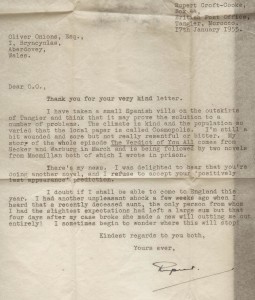Before 1967, when as a result of the Wolfenden Report, homosexual acts  between consenting adults were made legal, many men from all backgrounds, including actors, writers and at least one famous mathematician, were prosecuted and sometimes jailed. The persecution of Dr Alan Turing, the genius who helped the UK win the Second World War, is a shameful blot on the English penal system, but another victim of the law whose conviction has aspects in common with that of Turing is the less well-known writer Rupert Croft-Cooke (1903 – 75).
between consenting adults were made legal, many men from all backgrounds, including actors, writers and at least one famous mathematician, were prosecuted and sometimes jailed. The persecution of Dr Alan Turing, the genius who helped the UK win the Second World War, is a shameful blot on the English penal system, but another victim of the law whose conviction has aspects in common with that of Turing is the less well-known writer Rupert Croft-Cooke (1903 – 75).
In 1953 Joseph Alexander, the companion and secretary of Croft-Cooke, a prolific novelist, crime writer, short-story and screenplay writer, picked up two sailors in the famous Fitzroy Tavern , and took them back to Croft-Cooke’s house in Ticehurst, Sussex. After they were plied with drink Alexander and Croft-Cooke had sex with them. On their way back to London the sailors got drunk and assaulted some men, including a policeman. After their arrest the sailors agreed to tell the police about their sexual encounter in return for immunity from prosecution. Croft-Cooke and his assistant were duly arrested, tried for gross indecency, convicted and jailed. Croft-Cooke was sentenced for six months and spent time in Wormwood Scrubs and Brixton.
Almost exactly a year earlier Alan Turing had been arrested for the same offence when his lover, Arnold Murray, confessed after a burglary at Turing’s home that he was in a relationship with the mathematician. Turing pleaded guilty and was given the choice of a prison sentence or a period of probation during which he would undergo treatment with female hormones. This therapy effectively castrated him and he also grew breasts. He also lost his security clearance, which curtailed his career with GCHQ. But Turing coped well with his new state and was working on new projects when he was found dead at home in 1954. Although cyanide was detected in his body it is now believed that this probably emanated from apparatus in his home that used potassium cyanide to electroplate metal. Croft-Cooke may have been offered the same choice as Turing to avoid jail, but chose incarceration. On being released he rented a small villa in Tangier. In January 1955 he wrote to his friend and fellow novelist Oliver Onions about his experience. After announcing his emigration he turned to his spell in jail and its effect on him:
‘… I’m still a bit wounded and sore, but not really resentful or bitter. My story of the whole episode The Verdict of You Allcomes from Secker and Warburg in March and is being followed by two novels from Macmillan both of which I wrote in prison…I had another unpleasant shock a few weeks ago when I heard that a recently deceased aunt, the only person from whom I had the slightest expectations , had left a large sum but that four days after my case broke she made a new will cutting me out entirely! I sometimes begin to wonder where this will stop!’
The two novels written by Croft-Cooke in prison were The Fall of Man and Seven Thunders, both of which appeared in 1955. After remaining in Morocco for fifteen years he left for Europe, living in West Germany and Ireland, among other countries. He died in Bournemouth in 1975. [R.M.Healey]

Croft-Cooke died in 1979, not ’75, as stated. Also, there is no evidence that the sailors were ‘plied with drink’, as stated above.
Does anybody know the address of Croft-Cooke’s house in Ticehurst?